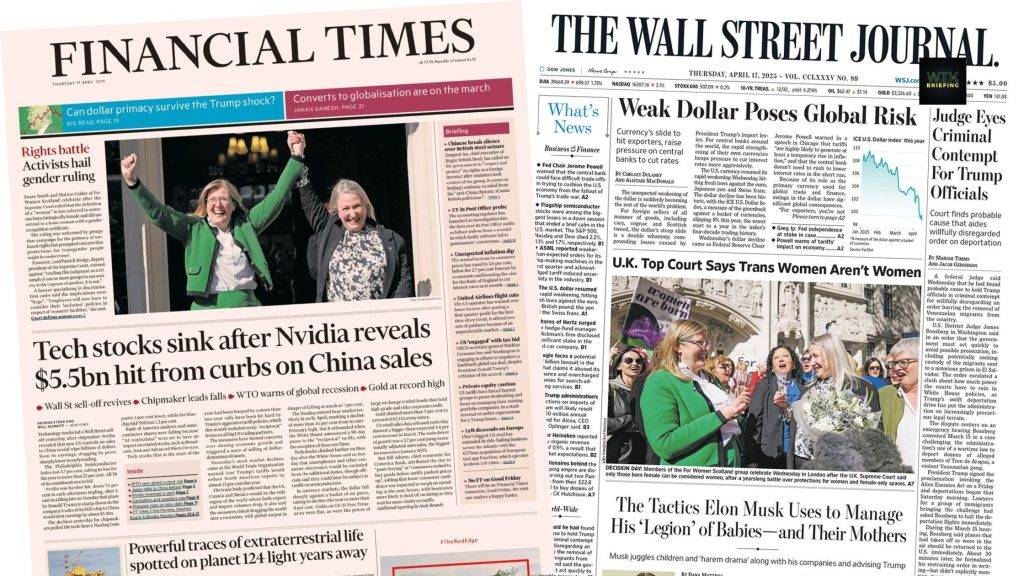The ongoing market chaos caused by Donald Trump’s tariffs continues to dominate the business newspapers, as do reports about inflation, job risks and a UK-US trade deal that comes at a price. Tech stocks suffered a Wall Street sell-off on Wednesday after Nvidia revealed new US controls on sales to China will wipe billions of dollars from its earnings. The US dollar has continued to weaken for the fifth straight day, amid real fears that the world could start the process of de-dollarisation.
UK-US trade deal – Gold jumps to new high – Tech stocks sink



Donald Trump’s tariffs put Federal Reserve’s jobs and inflation goals at risk, says Jay Powell
Explainer: The headline uses bias and sensationalism by directly linking Trump’s policies to economic danger, which may provoke fear or criticism. It personalises the issue by naming Trump, assigning blame, and amplifying the stakes with phrases like “at risk.” The framing may exaggerate the certainty or immediacy of the threat for dramatic effect, a common tactic to attract clicks and engagement.
- FT says Donald Trump’s tariffs are “likely” to put at risk the Federal Reserve’s goals of keeping prices and unemployment in check, chair Jay Powell warned, as he emphasised the US central bank’s focus on inflation.
Tech stocks sink after Nvidia reveals hit from US curbs on sales to China
Explainer: The headline uses sensational language like “sink” to dramatise the market reaction, evoking urgency or alarm. It places blame on U.S. policy by highlighting “curbs on sales to China,” potentially framing the government action as harmful. By focusing on Nvidia—a major tech player—it personalises and amplifies the impact, making the story feel more significant and emotionally charged to attract reader attention.
- The FT reports Nvidia has been caught by surprise following Trump’s new export controls on its best-selling AI chip in China. Tech stocks led a Wall Street sell-off on Wednesday after chipmaker Nvidia revealed that new US controls on sales to China would wipe billions of dollars from its earnings, dragging its peers sharply lower in early trading.
Gold hits new record over US-China trade war fear
Explainer: The headline uses sensationalism with “new record” and “fear” to evoke urgency and anxiety. It frames the trade tensions dramatically as a “war,” amplifying conflict to draw the reader’s interest.
- BBC News says gold has jumped to a fresh high as investors fret over the impact of the trade war between the US and China. Spot gold touched $3,357.40 (£2,540) per ounce on Wednesday, before dipping from its peak. It has risen by around a third since the start of the year.
‘How dare the US attack the UK’s free speech’: Independent readers call out trade deal demands
Explainer: The headline uses emotionally charged language like “How dare” and “attack” to create drama and outrage. It frames the U.S. as the aggressor and suggests a threat to fundamental rights, while “readers call out” adds a populist tone, implying collective resistance and amplifying public dissent.
- The Independent reports on its readers’ opinions on the “US trade deal ultimatum”. It says readers have expressed outrage at JD Vance’s demand to scrap LGBTQ+ protections and call upon the prime minister to ‘defend British laws and not bow to US pressure.’
US dollar weakens as de-dollarisation becomes ‘real, and frankly scary, prospect’
Explainer: The headline uses alarmist language like “frankly scary” and “weakens” to create a sense of fear and urgency. Quoting “de-dollarisation” as a “real” threat lends credibility while dramatising the issue, and the emotional phrasing aims to provoke concern over the stability of the U.S. economy.
- CITY AM reports the dollar has fallen 0.7 per cent today, marking its fifth straight day of decline, as markets continue to reassess the currency’s position in the global economy. The DXY index, which tracks the dollar’s value against a basket of currencies, dropped to its lowest in three years in trading today.


